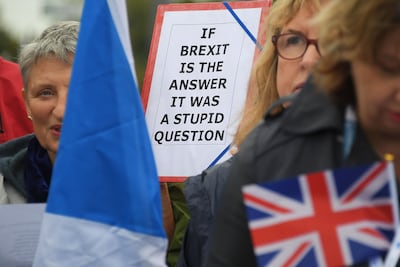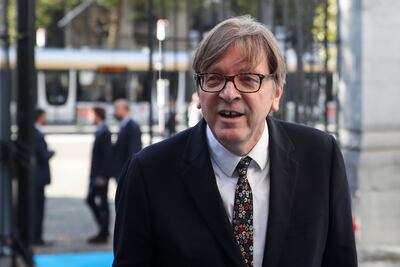In 1992, American political theorist Francis Fukuyama famously declared "the end of history". Now the former Belgian prime minister Guy Verhofstadt has made a similarly bold claim: he has pronounced the death of the nation-state.
Just as Mr Fukuyama did not literally mean that time had ceased its onward journey and that henceforth year would not follow year, so Mr Verhofstadt is not suggesting that national borders have melted away overnight. But his case is nearly as startling.
In a recent interview in the New York Review of Books, Mr Verhofstadt stated that the world today was "dominated by civilisations, not nation-states". He cited China, India and the US as examples and he pointed to their difference from other countries in his book Europe's Last Chance. India, for example, he said, had "2,000 nations, 20 different languages, four different religions but one single democracy".
By contrast with the “civilisations”, Mr Verhofstadt continued in his interview, a continent of nation-states like Europe “will mean something only if it acts together".
If he was only making the point that smaller countries are likely to achieve more if they ally with a common purpose, Mr Verhofstadt would have been stating the obvious. But he went far further.
“Sovereignty doesn’t exist in a globalised world. Sovereignty means that you can decide your own path.” Smaller states such as those in Europe, he added, “are not able to do that". Thus Mr Verhofstadt effectively read the last rites of the nation-state – for, devoid of sovereignty, it can hardly be said to exist in any meaningful sense.
This is provocative indeed and would, I imagine, be fiercely disputed by nearly every country in the world, small or large. Even a tiny principality such as Monaco exercises a degree of autonomy that contributes to its sovereignty. And the vast majority of developing countries in Asia and Africa, many deeply conscious that they have only been masters of their own sovereign decision-making in the five or six decades since they won independence from colonial powers, are deeply protective of that self-determination.

Of course, sovereignty for any country that engages with the world is rarely complete. Every nation has to make compromises; they are usually termed "agreements" or "treaties". But a jealous guarding of their own supreme authority is the precise reason why the member states of other regional bodies such as the Association of Southeast Asian Nations (Asean), the Economic Community of West African States (Ecowas) and the South American trade bloc Mercosur will never contemplate the loss of their own powers that the European Union (EU) route to a federal superstate – or civilisation – demands.
Mr Verhofstadt says that these countries have no sovereignty. I suggest he tries telling them that.
Further, the idea that these groupings have no influence because they have not become “civilisations” is just not true. Asean, for instance, is often criticised for moving too slowly or not doing enough. But it has contributed enormously to largely keeping the peace in a region of 650 million with possibly the greatest mix of religions and ethnicities on the planet. And much of the security architecture of the greater Asia Pacific, like the 18-member annual East Asia Summit, has been built and led by Asean.
One could also add that smaller nation-states should continue to be able to “decide their own paths” if the international rules-based order means anything and if global bodies such as the United Nations are even remotely doing their jobs.
So why would Mr Verhofstadt make such vehement assertions? Well, he is a fervent believer in the EU and has long been a prominent figure in its parliament. Ideologically, he is predisposed to believe that sovereignty can only be properly exercised through its institutions and officials. Perhaps he is right about Europe, a continent in long-term relative decline that is predicted by PriceWaterhouseCoopers to make up less than 10 per cent of global GDP by 2050.
But he is surely wrong about other countries. What about Indonesia, Brazil and Mexico, expected, according to the same survey, to be the fourth, fifth and seventh-largest economies in the world by mid-century: will they not be sovereign – masters of their own destinies?
True, Mr Verhofstadt is not alone in taking such a dim view of the idea of national sovereignty. Essays predicting its demise have been published for many years.

But he is unusually disparaging about its future. He might consider this to be hard-headed realism, or he might be an idealist for a borderless internationalism. Describing nationalism as a "spectre" that "is haunting Europe, our values and our future" – as he did in a tweet last year – suggests that he has little attachment to the notion of the political independence that many treasure; and quite innocently, too, for there is nothing inherently malign, racist or nativist about nationalism – a love of one's country that I do not distinguish from patriotism.
Many of the towering figures of the 20th century were, after all, nationalists of an almost mystical variety. General Charles de Gaulle had “a certain idea” of France. Eamon de Valera said: “If I wish to know what the Irish want, I look into my own heart.” Mahatma Gandhi said that he called himself a nationalist “but my nationalism is as wide as the universe; it embraces all nations".
I think Mr Verhofstadt underestimates this spirit and the extent to which it undergirds the fierceness with which nation-states will fight to preserve their sovereignty. They believe it exists and they believe they themselves will continue to exist. I could be proven wrong. Perhaps war and conquest will produce “a world order based on empires,” as Mr Verhofstadt has also put it. But I hope not. As an optimist, I would say that it is far too premature to predict the end of the nation-state.
Sholto Byrnes is a commentator and consultant in Kuala Lumpur and a corresponding fellow of the Erasmus Forum


